
Berenice Abbott New York City at Night 1932

The WHO says yesterday set a new world record. They’re two days behind Worldometer. But bad enough anyway. Florida is something else.

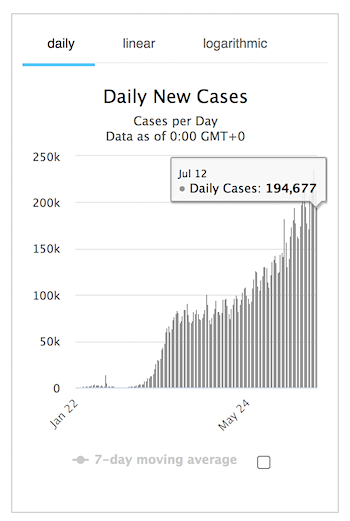
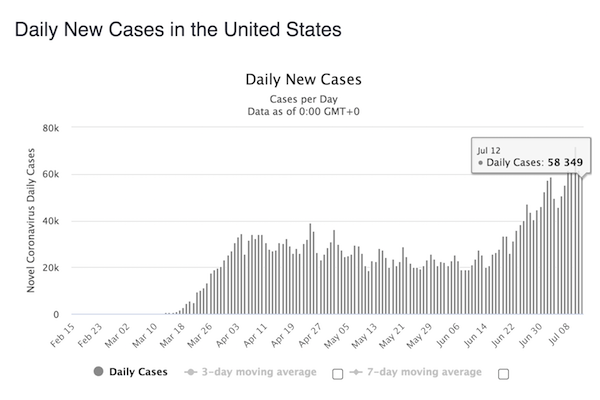

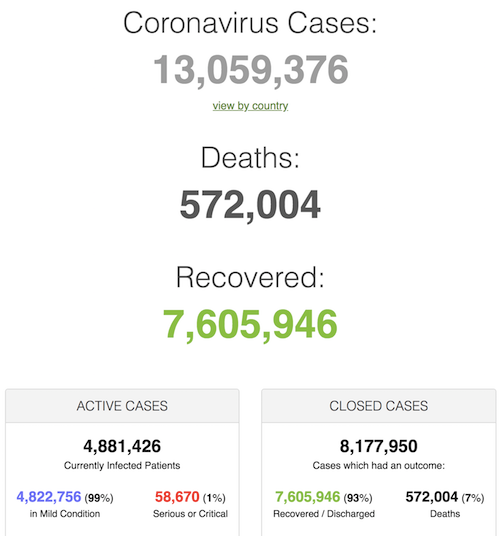

Ben Hunt
Florida reported >15,000 new Covid cases today. That’s not just a record number, it’s about 40% higher than the previous record number from 2 days ago.
Arizona reported 86 Covid deaths today. Last Sunday they reported 4.
Reopening schools in 6 weeks will break us.
— Ben Hunt (@EpsilonTheory) July 12, 2020
Ben Hunt Fauci
I think Fauci has been terrible, in a Vichy / Marshal Petain sort of way. I’m old enough to remember his “noble lie” about not wearing masks, and his 60k deaths estimate. NOW he wants to speak truth to power? Pfft.
Of course, if he’s Petain …https://t.co/iAg01EDmam
— Ben Hunt (@EpsilonTheory) July 12, 2020

“This is an American tragedy.”
• Florida Sets Record For Single-Day Covid19 Cases As Disney World Reopens (DL)
Even as Disney World reopens and the Florida state government was being pushed to host in-person classes for the fall school semester, the Sunshine State is setting new records for COVID-19 cases. The Florida Department of Health reported 15,299 new coronavirus cases Sunday. That’s the highest total for any state since the pandemic started. Florida holds the dubious record for second-highest as well, coming in with 11, 434 new cases on July 4, per Johns Hopkins University. Florida’s test positivity rate is a whopping 19.60%, Johns Hopkins said.
Florida Rep. Donna Shalala said the virus is “out of control,” and said it’s likely a second economic shutdown looms. “It’s out of control across the state because our governor won’t even tell everybody to wear masks. At least in Miami-Dade county, everyone must wear a mask when they’re outside,” she told CNN Saturday night. “This is an American tragedy.” About 40 hospitals across Florida have no ICU beds available, according to state data.

What should we expect from this? Water under the bridge.
• Who When Where: No Word On WHO Experts’ Coronavirus Trip To China (SCMP)
A World Health Organisation advance team is in the Chinese capital this weekend but few other details have been released about a mission that could lay the groundwork for an investigation into the origins of the coronavirus pandemic. The WHO said last week that two experts – an animal health specialist and an epidemiologist – would start work on Saturday but by Sunday evening there was still no word on the name of the specialists, the schedule of the trip, and their agenda. Chinese authorities did not make a statement about the visitors on the weekend and the Chinese media did not report their arrival. And no Chinese institution, including the Chinese Centre for Disease Control and Prevention, confirmed that it had or would confer with the WHO experts.
Associated Press reported that the two experts were in Beijing on Saturday and Sunday. Their mission is to work with Chinese health officials and scientists to prepare for a larger WHO-led international task force at an undisclosed date. The mission is widely seen as a way to bring more transparency and cooperation to the search for the animal origins of the virus, first identified in Wuhan in central China late last year. But the origins of the pandemic are mired in politics. Some senior members of the US administration have blamed China for the pandemic, including making unsupported claims that the virus could have emerged in a Wuhan laboratory. Chinese officials have pushed back, defending the country’s handling of the outbreak and saying the identification of the virus in China does not mean it originated there.

This is an ad. It’s about the headline. Read the article and there’s nothing there: “More research was needed to determine if the improvement was attributable to the drug or other factors..”
• One In Three South Korean COVID19 Patients Improve With Remdesivir (R.)
One in three South Korean patients seriously ill with COVID-19 showed an improvement in their condition after being given Gilead Sciences Inc’s (GILD.O) antiviral remdesivir, health authorities said. More research was needed to determine if the improvement was attributable to the drug or other factors such as patients’ immunity and other therapies, they said. Remdesivir has been at the forefront of the global battle against COVID-19 after the intravenously administered medicine helped shorten hospital recovery times in a U.S. clinical trial. Several countries including South Korea have added the drug to the list of treatment for the disease caused by the novel coronavirus. There is no approved vaccine for it.
In its latest update on the drug, Gilead said on Friday an analysis showed remdesivir helped reduce the risk of death in severely ill COVID-19 patients but cautioned that rigorous clinical trials were needed to confirm the benefit. The Korea Centers for Disease Control and Prevention reported on Saturday results from a first group of 27 patients given remdesivir in different hospitals. Nine of the patients showed an improvement in their condition, 15 showed no change, and three worsened, KCDC deputy director Kwon Jun-wook told a briefing. The result had yet to be compared with a control group and more analysis was needed to conclude remdesivir’s benefit, Kwon said.

This is not a fantasy, it’s set to happen. The bottom is falling out.
• Looming Evictions May Soon Make 28 Million Homeless In US (CNBC)
Emily Benfer is the chair of the American Bar Association’s Task Force Committee on Eviction and co-creator of the COVID-19 Housing Policy Scorecard with the Eviction Lab at Princeton University. CNBC: How does the eviction crisis brought on by the pandemic compare with the 2008 housing crisis? Emily Benfer: We have never seen this extent of eviction in such a truncated amount of time in our history. We can expect this to increase dramatically in the coming weeks and months, especially as the limited support and intervention measures that are in place start to expire. About 10 million people, over a period of years, were displaced from their homes following the foreclosure crisis in 2008. We’re looking at 20 million to 28 million people in this moment, between now and September, facing eviction.
CNBC: You study the intersection of housing and health. What will all these evictions mean for people’s health during the pandemic?
EB: Eviction negatively impacts the trajectory of an individual’s life, and it can do that in a permanent way. Studies have demonstrated that eviction causes increased mortality and causes respiratory distress, which in the Covid-19 pandemic can put people in even greater peril. It results in depression, suicides and other poor health outcomes. And the primary response to Covid-19 has been to shelter in place. If there’s an increase in homelessness [one economist estimates homelessness could rise by more than 40% this year], that could spread the virus.
CNBC: You’ve been keeping track of what states are doing to protect tenants, mostly through eviction moratoriums. How do you feel the efforts have fallen short?
EB: Some of the moratoriums are limited to different segments of the population, and in their duration. They were also not coupled with financial assistance to ensure that renters don’t accrue this backed-up debt and are stabilized enough to stay in their unit. Another issue is that in some states, landlords were allowed to go forward with a hearing on eviction, and even receive an order of eviction, and it was only forestalled at the execution stage. That means that there are a number of evictions that are just waiting for the sheriffs to execute. The moment the moratoriums lift, all of those families will be immediately put out. And right now, 29 states lack any state level moratorium against evictions.

As millions of Americans will be evicted, the banks will be bailed out.
• “Too Big To Fail” Banks face Their Worst Quarter Since The Financial Crisis (ZH)
U.S. banks could be setting up for their worst quarter in more than a decade as loan loss provisions and the pandemic are set to wreak havoc on bottom lines. Next week, many of the “too big to fail” banks are set to report earnings and are likely going to show that a drop in consumer spending and higher loan losses were not offset by better trading gains. Loan-loss provisions should reach their highest levels since the financial crisis, Barclay’s predicts. Kyle Sanders, an analyst at Edward Jones, told Bloomberg: “We’ve got a full three months of the pandemic coming through the numbers now. The first quarter was rough, but it really only reflected a couple of weeks in March.”
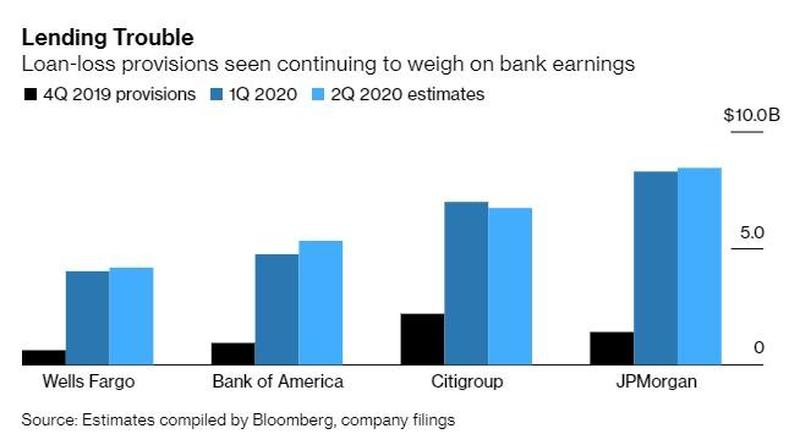
Loan losses are expected to rise as spiking unemployment has left many unable to service, or pay back, their loans. New loans have also dried up as banks tighten their belts. Service charges and credit card fees are also likely going to fall, as large portions of the American economy were shut down for months, suffocating economic activity. And while many banking stocks have recovered somewhat, the S&P 500 Financials index is still down 26% since last December. Wells Fargo alone is down 55% this year and is expected to announce a dividend cut. Bloomberg has predicted that despite increasing provisions in the first quarter of the year, banks are still going to have their worst quarter in a decade when they report this upcoming week.
Wells Fargo Chief Financial Officer John Shrewsberry commented last month that the bank would likely set aside more for bad loans in Q2 than the $4 billion it set aside in Q1. Banks will be looking to trading and underwriting to help try and salvage the quarter. Stock and bond trading was likely up about 31% in Q2 according to estimates. JP Morgan is expected to post the largest increase of about 50%. Citigroup Inc.’s Richard Zogheb, global head of the debt capital-markets division, said he thinks there will be record volumes in trading for the quarter. This stands at odds with previous cyclical downturns, where investment banking and trading revenue would fall as much as 30%.

Free money. Much of it will also be bailed out, so why worry?
• Coronavirus Brings Record $1 Trillion Of New Global Corporate Debt In 2020 (R.)
Companies around the world will take on as much as $1 trillion of new debt in 2020, as they try to shore up their finances against the coronavirus, a new study of 900 top firms has estimated. The unprecedented increase will see total global corporate debt jump by 12% to around $9.3 trillion, adding to years of accumulation that has left the world’s most indebted firms owing as much as many medium-sized countries. Last year also saw a sharp 8% rise, driven by mergers and acquisitions, and by firms borrowing to fund share buybacks and dividends. But this year’s jump will be for an entirely different reason – preservation as the virus saps profits. “COVID has changed everything,” said Seth Meyer, a portfolio manager at Janus Henderson, the firm that compiled the analysis for a new corporate debt index.
“Now it is about conserving capital and building a fortified balance sheet”. Companies tapped bond markets for $384 billion between January and May, and Meyer estimates that recent weeks have set a new record for debt issuance from riskier “high yield” firms with lower credit ratings. Lending markets had slammed shut for all but the most trusted firms in March, but have been opened up wide again by emergency corporate debt buying programmes from central banks like the U.S. Federal Reserve, the European Central Bank and Bank of Japan. Companies included in the new debt index already owe almost 40% more than they did in 2014, and growth in debt has comfortably outstripped growth in profits.

“..the first time in the company’s 17-year history that one of its new vehicles turned a profit in its first quarter..”
• Tesla Slashes Model Y SUV Price Four Months After Launch (R.)
Tesla cut the price of its sport utility vehicle Model Y by $3,000, just four months after its launch, as the U.S. electric carmaker seeks to maintain sales momentum in the COVID-19 pandemic. The reduction follows price cuts in May on Tesla’s Model 3, Model X and Model S. The company headed by Elon Musk this month posted a smaller-than-expected fall in car deliveries in the second quarter, resilient results despite the pandemic that hit the global auto industry. The Model Y now starts at $49,990, down nearly 6% from its previous price of $52,990, according to the carmaker’s website.
Tesla did not immediately respond to a Reuters request for comment. The company started deliveries of the Model Y in March, promising a much-awaited crossover that will face competition from European carmakers like Volkswagen rolling out their own electric rivals. In April, Tesla had said the Model Y was already profitable, marking the first time in the company’s 17-year history that one of its new vehicles turned a profit in its first quarter.

So we’re going to stop the climate disaster through sheer incompetence?
Sorry, but these sort of things bring out the skeptic in me like little else. I get that they mean well, but…
Let’s begin with scrapping terms like zero carbon, zero emissions and green energy. They are misleading nonsense.
“..for the first time ever, a group of intellectuals associated with Extinction Rebellion (XR) lay out a post-COVID-19 vision for the policies that could deal with the multiple crises we now face — and how a renewal of democracy is essential to save us from future health and ecological disasters. This statement is published exclusively in Byline Times by the XR ‘Brains Trust’, a group of thinkers including David Graeber, Illona Otto, Rupert Read, Jason Hickel, Steve Keen, Steve Melia, Henry Muss, George Barda and Rebecca Bowers.
• Coronavirus Has Shown us How to Stop a Climate Disaster (BT)
According to economic textbooks, the role of finance is to allocate economic resources towards best meeting future needs. In the process, we are always told, this guarantees freedom, happiness, and well-being. Global financial markets are, therefore, a kind of superior, planetary substitute for state systems of central planning. But if so, it’s hard to imagine how they could do a more disastrous job, careering from crisis to crisis, requiring endless bailouts, while concentrating most of the world’s wealth in a tiny number of hands, wiping out species after species, and, immanently, rendering large swathes of the planet uninhabitable.
The only plausible explanation is that the economic textbooks are wrong. Global financial markets aren’t really ways of directing resources towards future benefit. They aren’t even really markets. They are power arrangements, which mainly operate by colluding with Governments to extract rents, largely, by creating public and private debt. In these areas, the public and private sector become so closely entwined that it’s difficult to even distinguish them. For instance, the crisis has made clear that Governments with their own currencies are perfectly capable of creating money at will, simply by getting the Central Bank to buy bonds from the Treasury. This can either be done directly, or via the contrivance of selling them first to the finance sector and then buying them back.
So, it follows, the same resources now devoted to keeping destructive industries afloat could simply be redirected to do the opposite. There is no reason not to allow fossil fuel, air travel, and much of current construction to simply collapse for lack of subsidy; redirecting the money instead to green projects, retraining, and a basic citizen’s income. The only way to guarantee humans are protected from future catastrophe then is to ensure a dramatic shift of power relations. Do we expect Governments to just go right ahead and implement this? Obviously not.
Governments are ultimately answerable to their citizens, and one thing citizens clearly don’t want, is to go back to how things were before. A recent survey found only 9% of British citizens want to return to life as it was pre-COVID-19. We can be certain there will never again be such reliance on air travel or commuting. And it’s unlikely citizens will ever again blindly accept ‘there’s just no money’ as an argument for failing to invest or to help the poor. The magic money tree was found, after all, this April.

“..de facto gatekeepers of information..”
• American Collusion: Weaponizing Media, Big-Tech, & Government (ZH)
In late October 2016, Jason Sullivan – then chief Twitter strategist for Roger Stone, used a data-mining tool he created, Power10, to peer into the public sentiment of the election. Outgunning the antiquated polling surveys that got it so wrong, Sullivan witnessed candidate Hilary Clinton catch up to Trump two weeks before the election in real time. He then saw, a few days later, how FBI Director James Comey gave Clinton a temporary boost that helped her overtake Trump when he announced the bureau would reopen the investigation into her email scandal. Since that time, Jason Sullivan hasn’t told his story about what happened behind the scenes leading to the biggest presidential upset election in more than a century. He wasn’t able to.
That’s because the FBI swept Sullivan up in a dawn raid in early 2018, after intimidating other members of his family. The FBI hauled him off to testify under oath of perjury before the Mueller team. Surviving the FBI interrogation, Jason Sullivan retreated from the social media spotlight. That was until this June when he saw the establishment’s coordinated effort to tilt the 2020 election against President Trump, again. The COVID-19 outbreak and subsequent lockdowns gave blue states cover for an all mail-in paper election. The Black Lives Matter (BLM) and Antifa protests, looting and riots further shut down cities across the United States. Some posed the theory that funds donated to BLM flow through ActBlue, another political front company, and into the DNC.
The biggest lever in tilting the election this year, however, emerges with the collusion between the mainstream media and the tech giants as de facto gatekeepers of information. They wield tremendous power to determine what can and cannot be said, seen, shared and posted. They include Twitter, Facebook, Google and YouTube, among others. All this boils down to one objective: Censorship. Surviving the Mueller interrogation, Sullivan developed a strong opinion on both censorship and what transpired during the last presidential election. “On November 8th, 2016, all the laws of gravity were completely defied, and the legitimacy of every last one of the traditional political polls were utterly destroyed and proven beyond a shadow of a doubt to be completely inaccurate in what went down as the single biggest political upset in modern-day history,” Sullivan said.
“The DNC, Hilary Clinton, the Obama administration, all the Democrats, all the leading newspapers and publications, the establishment Republicans and the RINOs were ALL completely caught flat-footed! If any one of the traditional polls were remotely accurate, candidate Trump did not stand a snowball’s chance in hell of winning the presidential election.” Sullivan concluded his first salvo, stating, “There is no one today who will argue that Donald Trump won the presidency because of social media … not even President Trump. But social media is what allowed candidate Donald Trump to completely circumvent the mainstream media and get his message out directly to the people.”
On Twitter shadow-banning, Sullivan observed the “systemized censorship that if Twitter staff members didn’t like a user’s tweet, they would zap the user’s account, for a period of time. Meaning, everything the user would post would not show up on any of his followers news feeds. It’s like getting hit with a digital stun gun.”

Orange Man Bad is a profit machine for left and right.
• That Kind Of Memory Hole Is A Nightmare (Higgins)
Liberals are losing their minds over the Lincoln Project, a political action committee made up of a coalition of Republican strategists and admen who raised $16.8 million this past quarter to continue their mission of making commercials and posts aimed at upsetting Donald Trump. The group has been regularly praised for its “fearlessness” and the “powerful” content of its ads, liberals say, deeming the anti-Trump commercials “MUST WATCH” because “they are driving him crazy.”
A recent example used the coronavirus pandemic to make the case that Trump is an existential threat to the country. “If we have another four years of this, will there even be (big dramatic pause) an America?” asks a passably Ronald Reagan-imitating voice actor as somber music plays in the background in the punny “Mourning in America”-titled ad that came out this week. It was celebrated by Politico’s Joanna Weiss as a “masterful nugget of compact filmmaking.” Unsurprisingly for a group of former aides to Republican campaigns and party attachés who have run in the same circles for decades, the Lincoln Project is made up of exactly the kind of people who liberals profess to loathe: a collection of right-wing ghouls dominated by angry white men with bigoted, racist views that they’ve seldom been shy about sharing.
The group is reportedly little more than a slush fund for its members. A study on the Lincoln Project from the Center for Responsive Politics in May found the group’s finances suspect, at best, and that the organization was acting as a funnel for what The Atlantic called the coalition’s “motley crew” of leadership by directing the PAC’s cash to the interests and businesses of its directors and staff. “The Lincoln Project reported spending nearly $1.4 million through March,” the Center explained. “Almost all of that money went to the group’s board members and firms run by them.”
The Lincoln Project’s Team is led by eight founders and ten senior advisors, but the group’s core four is made up of George Conway, Steve Schmidt, John Weaver, and Rick Wilson. The quartet self-importantly announced the formation of their PAC in a tedious opinion piece for the New York Times last December, claiming that Trump represents some great departure from American conservatism (beyond saying the quiet part loud) and concluded the piece by likening their consultancy-trough-feeding and make-work organization to the Union forces in the Civil War.

We try to run the Automatic Earth on donations. Since ad revenue has collapsed, your support is now an integral part of the process.
Thank you.

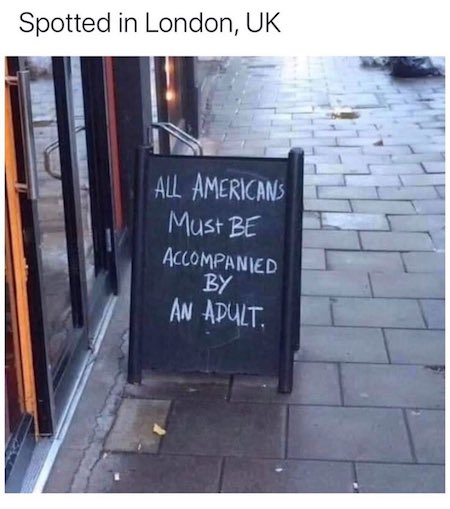

The man’s making a very good point.
I did not fully appreciate the issue with “most cops don’t live in the neighborhood they police” until seeing this https://t.co/59HACmmLy0
— Asher Vollmer (@AsherVo) July 10, 2020

Support the Automatic Earth in virustime.








Home › Forums › Debt Rattle July 13 2020